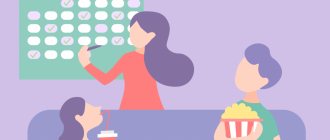Lifehack No. 1. Plan
Keep a diary and make plans for the day, week, month, year. For example, here is a list of things that Leo Tolstoy wanted to master in two years:
- “Study the entire legal science course required for the final university exam
- Study practical medicine and part of the theoretical
- Learn languages: French, Russian, German, English, Italian and Latin
- Study agriculture, both theoretical and practical
- Study history, geography and statistics
- Study mathematics, gymnasium course
- Write a dissertation
- To achieve an average degree of perfection in music and painting.”
Big plan, right? Surprisingly, Lev Nikolaevich coped with the task and managed to do everything.
How to plan your day?
There are many planning principles. It seems to us that the easiest way is to use the Eisenhower matrix.
To create such a matrix, take a sheet of paper and divide it into four parts - A, B, C, D.
A - urgent and important matter
B - not urgent, but important matter
C - urgent but unimportant matter
D - non-urgent and unimportant matter.
Square A - all “burning” tasks . Here we add all the cases where the deadline was “yesterday”. And those that expire today. For example:
- prepare for tomorrow's test
- make an appointment with a doctor because toothache interferes with sleep and thinking
- apply for a competition whose deadline is today.
Two principles of square A
- The kings of efficiency have it empty. They manage to get things done before they start to burn out.
- Include here the things without which you will not achieve an important goal. For example, the task “Go to the cinema, because today is the last day of the Fast and the Furious showing” “lives” in another square.
Square B - all the things that are important to do, but we have not yet missed the deadline for them . When you create tasks for the day, 90% of the tasks are from this square.
Two principles of square B
- Before you introduce a task here, ask yourself: “For what result am I doing this? What will I get in the final? If you can’t answer these questions, perhaps the problem “lives” in another square.
- Non-urgent does not mean “Delay until it becomes urgent.” For example, it is better to prepare for an exam in advance, when you can distribute the load, and not the night before.
Square C - all tasks associated with distractions . For example, fixing a light bulb, choosing a gift for a relative’s birthday that you don’t really want to attend.
Two principles of square C:
- If a distracting task prevents you from moving on to the main one and it can be closed in 5-10 minutes, it is better to do it without delay. For example, replace a light bulb as soon as it burns out, rather than leaving it for later.
- Do not confuse square C and square A.
Square D is the procrastinator's graveyard . All the “time wasters” sit here - memes, computer games, news.
Two principles of square D:
- Can you refuse this task? Decline. You will be pleased with yourself if, instead of being stuck on social networks, you spend time on something useful.
- Did you get a lot done in a day? Look into the tasks of square D and allow yourself to do something unimportant but enjoyable.
How to use the Eisenhower matrix?
- Start your day with a task list. Make a list of things you want to accomplish today. And distribute them according to the Eisenhower matrix.
- Start things off with square A. Then move on to square B. And so on.
- Break big tasks into small steps. For example, the task “Prepare for the Unified State Exam in Biology” is unlikely to be solved in one day. But “Solve 2 tests and learn one topic” is fine.
Multitasking
As amazing as the human brain may seem to us, even it has its limitations. Multitasking is almost as harmful a factor as poor sleep and unsystematic eating. In this regard, our brain is very similar to a computer: it begins to freeze if there are many “programs” or tasks running. In other words, the more we plan to do in one time period, the more difficult it is for us to focus on completing one single, or even the main task. Consequently, its quality will suffer, which will only add to our own uncertainty. How to concentrate if you have a lot to do? We'll talk about this a little later.
Lifehack #2: Rest
If you don’t want to face such an unpleasant thing as emotional burnout.
Emotional burnout is a syndrome that develops under the influence of chronic stress and constant workload and leads to the depletion of a person’s emotional, energetic and personal resources.
Studying is very important, but life cannot be 100% only about it. Don't forget to devote time to family, friends, hobbies.
How to study so as not to forget to rest?
You can use the Pomodoro method. It is already known that we can only work productively for 30-40 minutes. Then you need a break. This is what the Pomodoro method is based on.
Set a timer for 30 minutes, choose one task you want to solve. For example, read one paragraph of a textbook, complete an assignment in one subject. For 30 minutes, do only this task, without distractions. When the timer goes off, take a 10-minute break. During this time, you can stretch your legs, look at social networks, and do something you like. And then focus again for 30 minutes on the next task.
A little motivation
[adsense1] Many people don’t need all the past reasoning at all. For them, the main difficulty is lack of interest in learning and boredom.
But what can I say here? A quote from artist Chuck Close sums it all up: “Inspiration is for amateurs, the rest of us just show up and work.” A person never does only what he loves; there are always problems and routine.
You just need to sit down and start, without any excuses. Get off your butt and get used to breaking your “I don’t want” every day. This is what life is all about, this is the kind of behavior that makes you respect yourself . Don't be lazy, start developing your character right now.
Lifehack #3: Take notes
When you take notes, you help information get into long-term memory. Therefore, in order to quickly learn new things, you need to take notes.
How to take notes?
For note-taking, the Cornell method is best suited. Take an A4 sheet and divide it:
- Write the name and date at the top
- Draw a vertical line: make the left column narrow, the right part 2 times wider.
- Separate the bottom block (5-6 lines) with a horizontal line.
So you have 3 blocks:
- Right, where you take notes on key points during the lecture
- The left one, which you fill in when you reread the right block. Here you write down the main points, the most important from the right block.
- The lower one, where you will write down brief conclusions from the columns above within 24 hours after the lecture.
To take notes, you can use markers, gel pens, diagrams, and drawings.
Set your priorities
It's not just your phone that wants to steal some of your time. Remember the employee who came up every 20 minutes with stupid requests. Constantly ask yourself: is this person's time a higher priority than my responsibilities? Are you giving your best? What do you study while you're standing in line or waiting for the bus?
Lifehack No. 4: Order in the workplace
Before you start studying, clean up your workspace:
- Remove everything unnecessary from the table
- Make sure that everything you need is at hand: textbooks, notebooks, paper, pens, a glass of water
- While studying, put your phone in sleep mode. Or download the Plantie app. In it, you grow a virtual tree when you are not distracted by your phone and do not open other applications and tabs. This helps you stay focused on tasks. Remember that if you are distracted for just 15 seconds, it will take you more than 10 minutes to get back to your previous pace of work.
Concentration: what it is and how it works
Let's start with the most basic: what is concentration? According to psychologists, it is the act of directing interest or action towards one goal. Yes, it sounds boring, but there is a very important idea hidden here.
What is concentration
To concentrate on one thing, you have to ignore everything else.
Concentration appears only when we say “yes” to one option and “no” to all the others. In other words, exclusion is a necessary condition for concentration.
What you don't do determines what you can do.
Tim Ferriss
writer, speaker
Of course, staying focused doesn't require saying no all the time; it's about saying no now, in the moment. Later you can do something else, but for now you should focus your attention on only one thing.
Focus is the key to productivity. By saying no to any other options, you open up your ability to complete the one remaining task.
Now the important question: what can you do to focus on the things that matter and ignore the unhelpful ones?
Why can't I concentrate?
Most people don't have problems concentrating. They have difficulty making decisions.
We can convince ourselves to focus on the task at hand by removing all distractions from the path. Have you ever had a task that you had to finish no matter what? You did it because the deadline made the decision for you. You may procrastinate, but as soon as the matter forces you to make a decision, you act.
Often, instead of making the difficult decision to choose one thing to do, we convince ourselves that it is better to multitask. But this is an ineffective approach, and here's why.
Why multitasking doesn't work
Technically, we can do two things at the same time. For example, watch TV and cook dinner or answer incoming calls during a phone call.
But it is impossible to concentrate on two things at the same time. You're either watching TV while stirring pasta in the pan in the background, or you're cooking pasta and the TV becomes background noise. At any given moment you are concentrating on either one or the other.
Multitasking forces your brain to quickly switch attention from one thing to another. And if the human brain could move from one job to another without additional effort, there would be no problem. But our heads don't work that way.
Remember a time when someone interrupted you while you were writing a letter. When the conversation ends, it usually takes you a few minutes to get your bearings, remember what you wrote about, and continue. Something similar happens when you do several things at once.
Every time you switch from one task to another and back again, you have to exert mental effort.
In psychology, this is called the switching cost effect.
Switching costs are the interruptions in productivity we experience when we shift our attention from one task to another. ResearchReducing the effect of email interference on employees. A 2003 study published in the International Journal of Information Management found that when distracted by routinely checking email every five minutes, a person spends an average of 64 seconds resuming the task at hand.
In other words, we waste one minute out of every six on email alone.
The myth about multitasking is that it makes you more efficient. What really matters is concentration.
Listen to music or white noise
Ideally, concentrated work requires complete silence. If you know a place with such conditions, share the secret.
Whether you work in an office or at home, you'll need isolation from loud noise to stay focused. Try these three options and determine the best one for you:
- Favorite music – classical, rock, electronic or whatever. Even though you're not consciously listening, the brain includes the part responsible for creativity and imagination. This helps to find new solutions.
- Video game soundtracks often evoke positive emotions, even among those who haven't played them. Plus, video games also require concentration, which means the music was created to put you in that state.
- White or red noise are relatively neutral signaling sounds that fade from your consciousness after a while, but drown out other noise, especially with in-ear headphones.
Feature of consciousness
One of those who studied the problem of distractibility very deeply was the famous 19th century German thinker Friedrich Nietzsche. In his work “Untimely Thoughts,” he talked about how a person purposefully seeks out distractions in order to remain mentally occupied.
By acting this way, a person tries to postpone meeting with some important issues relating to life, work, career, relationships. He finds salvation in idle conversations, entertaining gatherings, and the Internet. You can even quote Nietzsche himself: “We are afraid, when we are alone and in silence, that they will whisper something in our ear, and therefore we hate silence and deafen ourselves by communicating with people.”
In addition, even responsible and important work can be a reason for distraction. It also distracts from serious thoughts. According to Nietzsche, a person plunges into daily work with such zeal and perseverance that his life is not at all required. It’s as if he doesn’t want to regain consciousness and continues to run away from himself.
But why don’t we still want to concentrate on what is really important? You can try to give a psychological explanation for this. People really want to feel independent, to feel that they are in control of their own lives, because this gives them importance in their own eyes.
Being distracted, we seem to go “against the system”, rejecting everything that is imposed on us, and this often happens even when we set tasks for ourselves. So we plan to immediately start developing a project in the morning, but after only five minutes we are sitting with a smartphone in our hands and chatting. But such a symbolic revolution is a revolution against ourselves and our own success.
Escaping from oneself
In fact, you don’t need to be a philosopher or psychologist to realize that a person is distracted because he doesn’t want to face the solution of vital issues, make fateful decisions, because it can be difficult, unpleasant, scary or painfully sad.
Someone may put off moving from their hometown for a long time, where all their friends and relatives are. Another cannot make the decision to leave a job he doesn’t like, where he pays well. The third is unable to break off a painful, but so familiar and long-term relationship. As a result, people are constantly distracted, not only from making decisions, but even from thinking about those decisions.
But running away from yourself is another illusion, a pathetic attempt at self-deception. For some time it will probably give relief, but ultimately the person will still come to an understanding of the pointlessness of his actions. It may not sound loud, but to stop being distracted, you need to learn to face the truth and take the difficult steps.
Save interesting things on the Internet
You really come across something worthwhile and useful on the Internet. It is imperative to consume the right information. But when you read constantly and spontaneously, even the most interesting things turn into a harmful distraction.
If you come across good material or receive a link to it from colleagues or friends, save it. There are special applications for this, for example, Getpocket. It also allows you to return to articles at the point where you left off reading. Having such a program on your smartphone will help you have a useful source of information with you and stop being distracted while working.
Remove apps
Radical method. Determine which apps on your smartphone or tablet are the most distracting. For example, you constantly think about Instagram. Remove it while working. Now you can check this social network only through a browser, where the functionality is severely limited. This method will definitely reduce the number of constant views of the feed. Once you complete the work task, install Instagram again.
Turn off notifications
Stop the dissonance of notifications about new spam emails, new tags in photos and likes on Instagram. Leave only important notifications - messages in the work messenger and calls.
Check the rest in your free time when you complete the task. To change the settings, rummage through your laptop and smartphone, look at the settings for social networks and email accounts. Life will become quieter, calmer and more measured.
Check from time to time only those groups, channels and dialogues that are important to your family and professional life.
Synchronize your work with your biorhythms
In the morning you are fresh and alert - it’s time to program. The brain was rested, the reserves of willpower to resist temptations were replenished. In addition, there is a greater chance of being in silence and solitude. Or work in the evening when everyone is leaving. Partial fatigue sometimes also helps: there is no extra strength or desire to be distracted. Plus, this period is considered favorable for creative tasks.
Choose any other time and don't be afraid to change your schedule to schedule programming for times when you feel effective.
Download the meditation app
The ability to meditate is one of the useful and powerful skills that will help you change your own life. These days there are a lot of programs that make meditation accessible, easy and understandable. In such services you can choose the duration of meditation and the topic. You can meditate for short periods of time while you are waiting for someone to meet or riding on public transport. These unique guides will help you not to be afraid of the exercises and understand their effectiveness.











